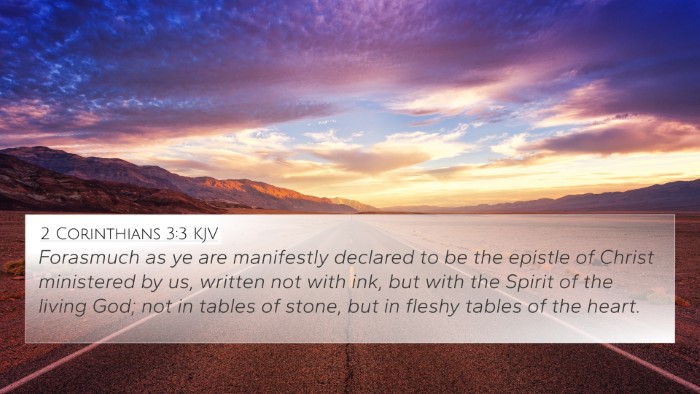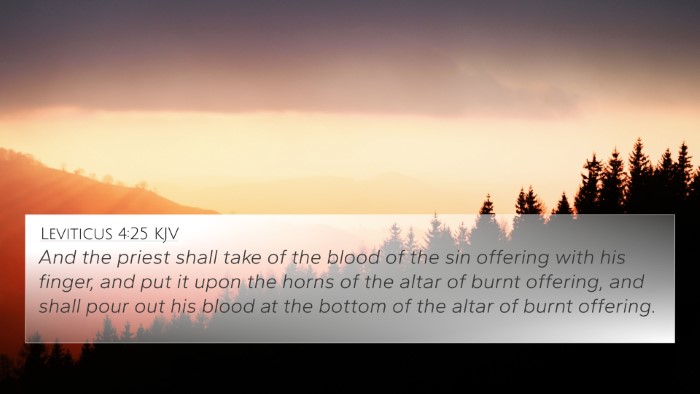Understanding Jeremiah 17:1
Verse: "The sin of Judah is written with a pen of iron, and with the point of a diamond: it is graven upon the table of their heart, and upon the horns of your altars."
Overview
This verse from Jeremiah depicts the deep-rooted nature of sin among the people of Judah. The prophet uses powerful imagery to illustrate how their sins are indelibly inscribed in their hearts, emphasizing the permanence and severity of their transgressions.
Key Insights from Commentaries
- Matthew Henry:
Henry asserts that the “pen of iron” signifies the enduring and unyielding nature of sin. Iron is a strong material, and in this context, it reflects the strength with which their sin has taken hold of their hearts. The reference to a “diamond” emphasizes not just permanence but the value placed on their iniquities over God’s commandments. The heart, which is meant to serve God faithfully, has become a tablet inscribed with disobedience.
- Albert Barnes:
Barnes situates the verse within the broader theme of human corruption and the consequences of turning away from God. He notes that the “table of their heart” indicates that their sins are not only visible but are foundational to their identity. This suggests a call for introspection regarding the moral state of one’s heart, underscoring the necessity of repentance.
- Adam Clarke:
Clarke interprets the use of “horns of your altars” as a poignant reminder of where they offer their sacrifices. It indicates that even the places of worship had become tainted by sin. The juxtaposition of their altars – meant for holy sacrifices – with their grievous sins suggests a profound hypocrisy and a warning against ritual without true spiritual integrity.
Bible Cross-references
This verse can be connected to several other scripture passages that further elucidate the nature of sin and the heart's condition. Here are some significant cross-references:
- Proverbs 7:3: "Bind them upon thy fingers, write them upon the table of thine heart."
- Jeremiah 31:33: "But this shall be the covenant that I will make with the house of Israel; After those days, saith the LORD, I will put my law in their inward parts, and write it in their hearts; and will be their God, and they shall be my people."
- Ezekiel 11:19: "And I will give them one heart, and I will put a new spirit within you; and I will take the stony heart out of their flesh, and will give them a heart of flesh."
- Romans 2:15: "Which shew the work of the law written in their hearts, their conscience also bearing witness, and their thoughts the mean while accusing or else excusing one another."
- Matthew 15:19: "For out of the heart proceed evil thoughts, murders, adulteries, fornications, thefts, false witness, blasphemies."
- Psalms 51:10: "Create in me a clean heart, O God; and renew a right spirit within me."
- Proverbs 4:23: "Keep thy heart with all diligence; for out of it are the issues of life."
Inter-Biblical Dialogue
Jeremiah 17:1 serves as a vital link between the Old Testament's warnings against idolatry and the New Testament's calls for a sincere and pure heart. The sin of Judah is echoed in the teachings of Christ who emphasizes the heart's importance in understanding righteousness.
Thematic Connections
This verse is pivotal for understanding themes of:
- The Nature of Sin: Sin is depicted as intrinsic to human nature, requiring divine intervention for transformation.
- False Worship: The sharp contrast between what is offered in worship and the actual state of the heart serves as a critique of hollow religious practices.
- Inner Transformation: God's plans include not only outward expressions of faith but an inner renewals of heart.
Conclusion
Jeremiah 17:1 serves as a profound reminder of the consequences of sin and the need for a heart aligned with God's will. By linking this verse to others throughout scripture, believers can gain a comprehensive understanding of the importance of maintaining purity of heart and the dangers of spiritual complacency.









